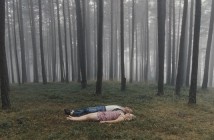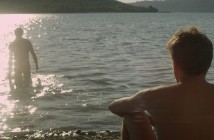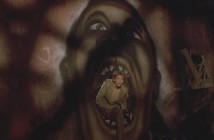
Blame festival frolicking for this week’s delay, though it’s perhaps not so gross an offender as House of Cards. The second season of Netflix’s flagship original drama, in all its thirteen hours of material, rather ate into this week’s viewing time to the tune of eight movies or so. It’s just as well in the end; Spacey and co are the best additions this week (read the review here), and among the only much worth your time. Read on for what you ought to avoid.

Haunter (Read our full review)
Cult Canadian director of Cube fame Vincenzo Natali returns with Haunter, a film it’s tempting—and not inaccurate—to dismiss as Groundhog Day with ghosts. But Brian King’s script, in which a teenage girl relives the same day over and over again as her family carries on oblivious, bears a trick-filled sleeve that makes it much more fun to watch than such a synopsis suggests. Much as his convoluted narrative may career out of control as the movie wanes on, the routes is takes on the way there offer at least an interesting alternate to the kind of treatment more typically seen in a story like this. Abigail Breslin is key, her performance a stronghold of unlikely emotion emblematic of the film’s intent to invoke feeling above fright. It may falter, and falter often, but it’s spawned of a sensibility we could stand to see more of in horror. SO-SO.

Passion (Read our full review)
Were it anyone other than Brian De Palma who’d directed Passion, it’s easy to imagine it being dismissed outright as a pale imitation of the director’s best work. But past the point of seventy, the playful provocateur continues to complicate matters with a movie so messy it must be more. That it’s a remake, perhaps, is telling: De Palma’s twist on the French Love Crime plays like a reductio ad absurdum corrective to the erotic thriller’s excesses by the man who made the formula a hit all those many decades ago. His self-aware style, all stupidly skewed angles and chaotic colour schemes, is like a demented answer to the genre’s evolution. The result is a film that’s more interesting to think about than it ever is to watch; as much as Rachel McAdams and Noomi Rapace’s overzealous performances might serve De Palma’s self-reflexive end, it’s an oft-irksome means to behold at such length. SO-SO.

Somewhere
Even Sofia Coppola fans struggle with Somewhere, her probably-personal look at the relationship between an aimless Hollywood actor and the young daughter who comes to stay with him at the Chateau Marmont. Coppola the younger’s style is easy to dismiss as airy, perhaps never more so than here; there’s little of the wit that made The Bling Ring such fun, nor much of the quiet characterisation of Lost in Translation. Instead, we have the dynamic of Stephen Dorff and Elle Fanning, who bear the burden of a script that shoots for subtlety but more often hits superficiality. Speaking of shooting, the late great Harris Savides excels as ever, his lensing lending the movie a nuance in which its story is sorely lacking. Coppola’s a smart filmmaker; the idea of Somewhere might well be to replicate the emptiness of its central figure in the film itself, but this is an idea, evidently, that’s just not enough to support a feature film. SO-SO.

The Dynamiter
There’s a touch of the South of Shotgun Stories to The Dynamiter, Matthew Gordon’s oft-arresting debut feature that traces a rootless summer in the life of a fourteen year-old whose crumbled family life seems set to derail his future with it. Newcomer William Ruffin does fine work as Robbie, a good-minded kid whose sinking school performance attests a troubled home life far more than a lack of academic acumen. Gordon’s is a slow-burn story, allowing its characters to reveal themselves to us slowly as the world shifts around them. The threat of tragedy hangs over them too; it’s indicative of the movie’s successes that it makes us fear for the worst, so endeared do we become to its characters. Yet the narrative they occupy is nothing new, and though Gordon may work well within this familiar framework, it’s one whose endpoint is effectively inevitable. Still, it’s a strong start: mark the name. WORTH WATCHING.

The Haunting of Helena
It’s movies the like of The Haunting of Helena that film purists like to hold up as examples of digital inferiority. There’s something about celluloid that gives a base beauty to all shots, no matter what’s done with them. Bad digital, though, is just plain bad, and that’s an aesthetic in which this hapless horror trades in spades. Directors Christian Bisceglia and Ascanio Malgarini don’t fare much better with their story either, loosely lumping together tropes of various tired horror stories in some half-baked tale of tooth fairies and terrifying children. Or at least they might be terrifying, if ever the directors could handle so much as a simple set piece: relying too much on decidedly unconvincing digital effects, theirs is a movie that’s more likely to make you laugh than jump, albeit never in amounts enough to alleviate the tedium of sitting through the thing. AVOID IT.

The Summit
It’s almost inevitable to bring up Touching the Void in talking about The Summit, as much for the dullness of its docudrama approach as the shared story of mountaineering disaster. Nick Ryan’s documentary chronicles what’s been called the most notorious day ever in the history of K2, the infamously fatal mountain on which a quarter of climbers lose their lives. Illustrating talking head recollections from a handful of survivors, Ryan’s approach melds diary footage with sleekly-shot reconstructions, unfolding in sequence as a means to tell the whole story from a host of individual perspectives. But Rashomon it ain’t, and the stop-start structure of the telling is nothing if not frustrating. The great Robbie Ryan’s sun-touched cinematography can only do so much; The Summit strives for engrossing survival mystery, but manages only to be something of a snowy slog. SO-SO.

Were the World Mine
All the world’s indeed a stage in this Shakespearean meta-adaptation, seeing the romantic comedy romp of A Midsummer Night’s Dream unfold in real life as an all-boys school puts on a production. It’s an ingenious idea on the part of debut director Tom Gustafson to contrast the traditional idyll of masculinity as embodied in this sports-heavy school with the free-loving framework of his source material, paving the way for a gay coming-of-age drama that’s earnest and affecting to the last. Its occasional explosions into full-on musical mania are as endearing as they are alarming; Gustafson’s approach might seem a tad reductive in itself given its binaries, but there’s enough in the raw humour of a whole town turned gay to abate that concern. It’s unsurprising, given his casting gigs on Hollywood movies, that the director has an eye for an actor; Tanner Cohen’s turn here is sumptuous and star-making. WORTH WATCHING.



